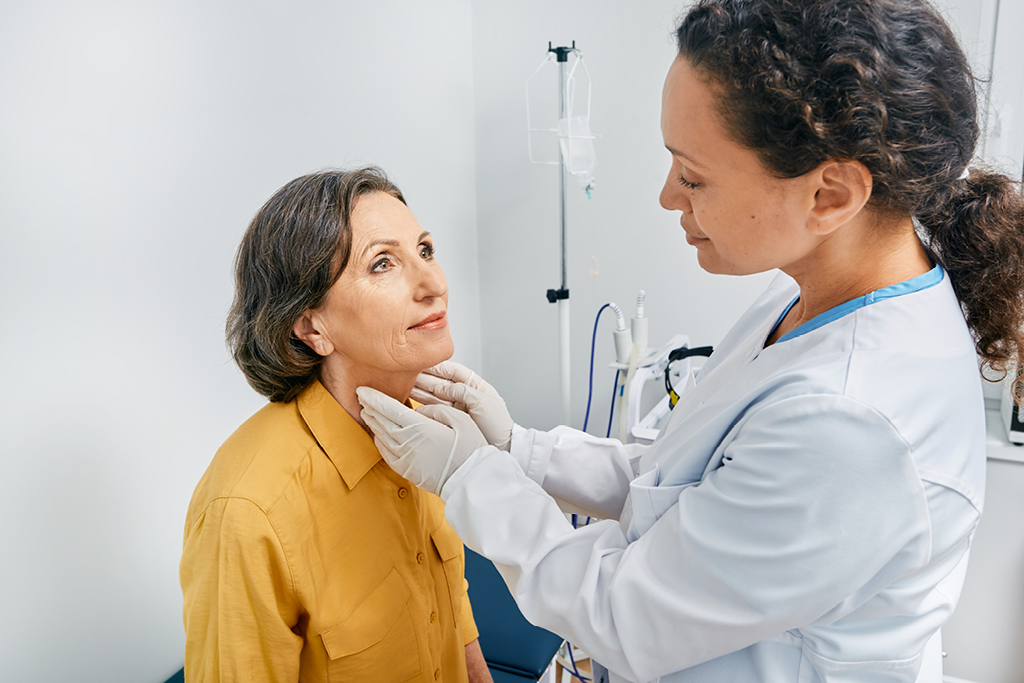
Did you know that January is National Thyroid Awareness Month?
Thyroid disease affects about 20 million people in the US. While many people are treated, about half are unaware they even have thyroid disease.
Trust the experts at Wilmington Health to provide the region’s best care for the diagnosis and treatment of your thyroid disease.
What is the thyroid, and what does it do?
The thyroid is a gland in the front of your neck that is shaped like a butterfly. It can be difficult to feel but it is very important as it produces specific hormones that you need for day-day function. These hormones control and influence your metabolism, body temperature and energy just to name a few.
What can go wrong with the thyroid?
Thyroid disease happens when the thyroid underproduces(hypothyroidism) or overproduces(hyperthyroidism) hormones or when there are nodules on the thyroid. Sometimes, cancer of the thyroid can also occur.
Signs of an overactive thyroid can include:
- Anxiety, irritability, or nervousness
- Changes to menstrual periods
- Enlarged thyroid gland
- Increased heart rate
- Insomnia
- Weight loss
- Muscle weakness and tremors
- Sensitivity to heat
Signs of an underactive thyroid can include:
- Coma or confusion
- An intolerance to cold
- Decreased heart rate
- Dry and coarse hair and hoarse voice
- Fatigue
- Weight gain
- Heavy menstrual periods
- Constipation
- Enlarged thyroid
Who is at risk of thyroid disease?
Thyroid disease affects people of all ages. Factors that increase the risk include:
- Advanced age (60 and older), especially in women
- Pregnancy
- Family history of thyroid disease
- Autoimmune conditions such as:
- Lupus
- Pernicious anemia
- Primary adrenal insufficiency
- Rheumatoid arthritis
- Sjögren’s syndrome and Turner syndrome
- Type 1 diabetes
- Medications/supplements such as:
- Lithium
- Iodine
- Contrast Dye
- Amiodarone
- Treatment for past thyroid conditions or cancers
Women of all ages are more likely to have thyroid disease than men. Thyroid issues can also be caused by pregnancy but can also affect pregnancy.
If left untreated during pregnancy, thyroid disease can cause:
- Miscarriage
- Preterm delivery
- Developmental problems in the child
How is thyroid disease diagnosed?
Many symptoms of thyroid disease are non-specific. This is why thyroid disease is not just diagnosed based on symptoms but instead based on specific testing. This often includes:
- Blood tests
- Imaging(usually an Ultrasound of the thyroid)
- Physical exam
If there are thyroid nodules, sometimes a biopsy of the nodules is needed in addition to labs, imaging and an exam. This involves using small needles to get a sample of thyroid tissue..
How is thyroid disease treated?
Sometimes, monitoring is all that’s needed. If the thyroid is overactive or underactive, the goal of thyroid disease treatment is to restore normal thyroid hormone levels. Treatment options include:
- Anti-thyroid Medications
- Thyroid hormone replacement
- Radioactive iodine ablation
- Surgery.
If you have questions or concerns about your thyroid, contact Wilmington Health’s Endocrinology department to schedule an appointment. Our specialists diagnose and treat:
- Adrenal disease
- Cancers of the endocrine glands
- Diabetes
- Endocrine hypertensive disorders
- Lipid disorders
- Menopause
- Metabolic disorders
- Obesity
- Osteoporosis and bone metabolic disease
- Over and underproduction of hormones
- Pituitary disorders
- Reproduction and infertility disorders
- Thyroid disease
